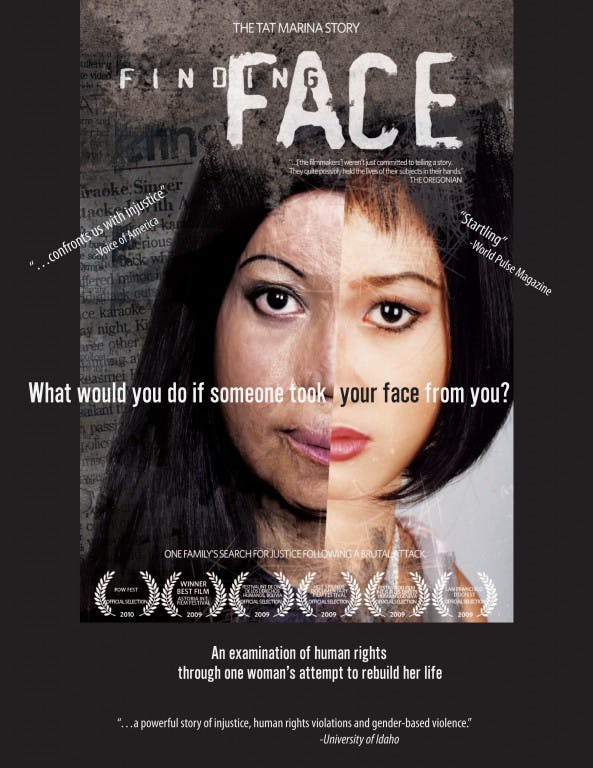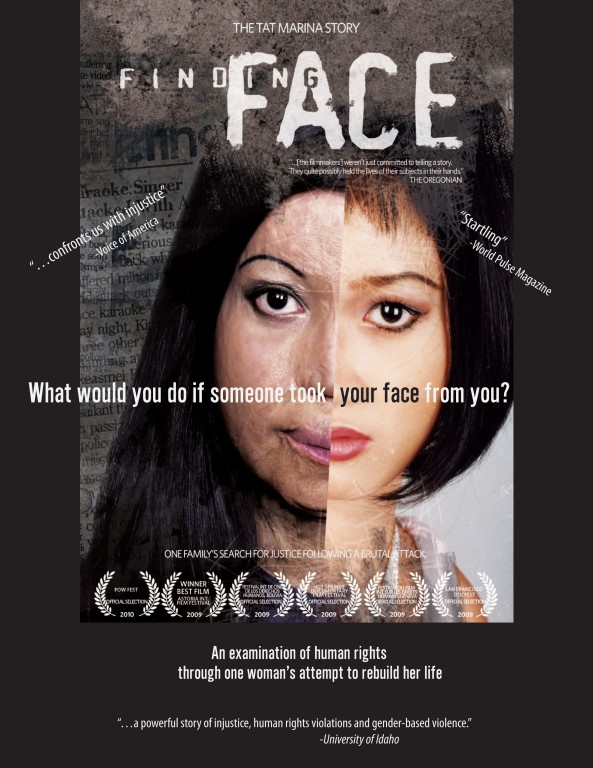Finding Face: Documentary Combats Acid Violence
Jan 21, 2015
Story


A sour fruit stand sits in the wet heat of monsoon season in Kampong Cham, Cambodia. Its vendor is pregnant. Eight months pregnant. A woman and a little boy pull up on a moto. He gets off the moto while she stays on. He’s carrying a plastic soda bottle filled with acid.
When he reaches the stand he quickly unscrews the cap and dowses the vendor’s face. The liquid drips onto her arms and stomach. Instantly she screams in agony. The boy dashes to his mother’s moto. The woman is blinded for life. She will give birth to a little girl who will only live for four days.
A crowded marketplace in Phnom Penh bustles. A sixteen-year-old girl strolls past the vendors, unaware that a group of men stalks behind her. When they catch up, they beat her to the ground and throw acid on top of her head. Her ears and skin melt, revealing bone. She is temporarily blinded, and will undergo a dozen surgeries in attempt to salvage her mangled face.
In both of these acid violence cases, the perpetrators planned the attacks because the victims were having affairs with their husbands. The motivation comes from the notion that if the mistress is no longer physically beautiful, the husband will break off the relationship. Monira Rahman, the Executive Director of the Acid Survivors Foundation, explains this mentality to the United Nations: ‘If I take her beauty away, no one will marry her.’
A 2003 report from the Project Against Torture says that wives seeking revenge on mistresses is one of the most common reasons for this type of violence. The report says, “the perpetrator does not want to kill the victim, but wants to do something worse than murder –make the victim suffer forever.”
Recovery from an attack is a painful process that entails burn treatment, physical therapy, and even reconstructive surgery. Beyond medicine, survivors can feel socially isolated and experience difficulty finding work. More often than not, perpetrators of acid violence can avoid legal ramifications for their cruelty, and so survivors go forward without justice.
The Project Against Torture report states, “While some acid throwers have been convicted and sent to prison, others—especially those with power or money—live freely.” The fruit stand vendor filed charges after her attack, but her lover and his lawyer paid her 500,000 riels, about 125 dollars, to drop them. The amount barely covered her medical expenses from recovery.
The sixteen-year-old in Phnom Penh received a threat, instead of compensation, for her acid attack.
Her name is Tat Marina, and she’d been romantically involved with Cambodia’s Undersecretary of State, Svey Sitha. When his wife committed the crime in 1999, he warned Marina that reporting it to the authorities would put her and her family in danger. Afraid for her life, she remained silent, that is, until she met filmmakers Patti Duncan and Skye Fitzgerald.
While shooting for their film Bombhunters in Cambodia in 2006, Duncan and Fitzgerald of Portland’s SpinFilm discovered the prevalence of acid attacks throughout the country. They were shocked at the number of people in the marketplaces who had deformities from chemical burns. Research led them to Tat Marina’s case, which had become well known among Cambodia’s residents, despite the lack of punishment for Sitha or his wife. The couple decided to seek justice for Marina by way of a documentary film; they lived in and out of Cambodia for the next three years shooting footage about her story.
Duncan and Fitzgerald ensured that Marina's family had moved out of Cambodia before premiering their documentary Finding Face last year. With the family safe from Sitha’s threats, they could screen their epic work, which features Marina’s voice recounting her attack and recovery.
Since the film debut, “We have seen Marina completely transform,” says Fitzgerald. “She is now an incredibly confident individual who’s willing to speak publicly to tell her story. Finding Face became a vehicle for the family to tell their truth.”
Acid violence is on the rise not only in Cambodia, but also in Afghanistan, Bangladesh, Pakistan, Ethiopia, China and the United States, to name a few. It’s brave survivors like Tat Marina and revealing media like Finding Face that allow for this issue to be fully realized.
To see the film trailer visit www.findingface.org. For updates on upcoming television airings of the film in the US and reporting about acid violence worldwide, follow @FindingFace on Twitter.




